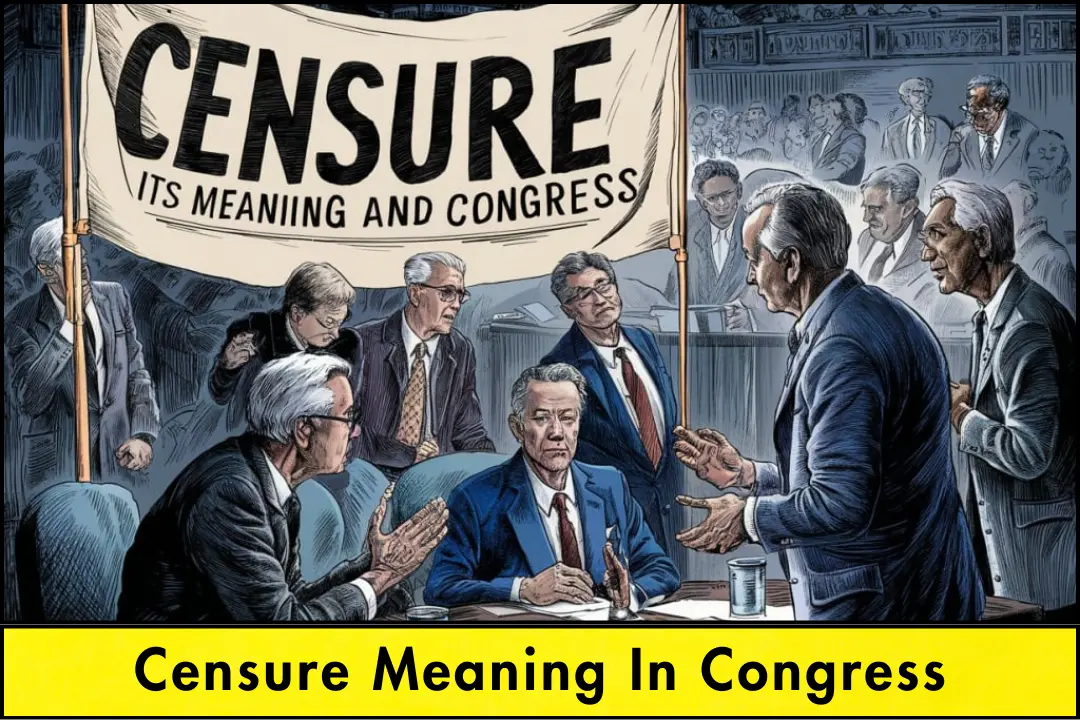Censure in Congress is a rare but powerful form of public reprimand that holds elected officials accountable for misconduct. While it does not carry direct legal consequences like removal from office, it serves as an official condemnation that can have lasting political and reputational effects. Understanding censure is crucial for grasping the mechanisms of congressional discipline and its role in American democracy.
The concept of censure has a long history in legislative bodies, both in the United States and beyond. It is a formal way for Congress to express disapproval of a member’s actions without resorting to more severe measures like expulsion. But what exactly does censure entail, and how has it been used over time? This article explores the meaning, process, and impact of censure in Congress, shedding light on its significance in shaping political accountability.
What Is Censure in Congress?
Censure is an official statement of disapproval issued by either the House of Representatives or the Senate against one of its members. Unlike expulsion, which requires a two-thirds majority vote and results in removal from office, censure is a formal reprimand that does not strip a member of their position. Instead, it serves as a public record of misconduct, often delivered in a humiliating manner where the censured member must stand before their peers while the resolution is read aloud.
Congress uses censure as a means of discipline for various infractions, including ethical violations, abuse of power, and conduct unbecoming of a public official. The severity of a censure depends on the circumstances, and while it does not remove a member from office, it can diminish their influence within Congress and harm their chances for re-election.
Historical Examples of Censure in Congress
Throughout American history, several members of Congress have faced censure for misconduct. One notable case occurred in 1834 when the Senate censured President Andrew Jackson for refusing to comply with congressional demands regarding federal deposits. Although Jackson later managed to have the censure expunged from the records, the incident showcased the Senate’s ability to formally rebuke high-ranking officials.
In more recent history, senators and representatives have been censured for offenses such as financial misconduct, ethical breaches, and inappropriate behavior. For example, Senator Joseph McCarthy was censured in 1954 for his aggressive and reckless accusations during the anti-Communist investigations. The censure significantly weakened his political standing and marked a turning point in his career.
How Is Censure Different From Expulsion?
Censure and expulsion are both disciplinary actions in Congress, but they differ in severity and consequences. Expulsion is the most extreme measure and requires a two-thirds vote in either the House or Senate. It results in the immediate removal of a member from office and has only been used in the most serious cases, such as those involving treason or severe corruption.
On the other hand, censure is a formal rebuke that does not remove a member but serves as a strong reprimand. It can impact a politician’s credibility, reduce their committee assignments, and affect their future political career. Because it is less severe than expulsion, censure is often used when misconduct is serious but does not warrant removal from office.
The Process of Censure in Congress
The process of censure begins when a member of Congress is accused of misconduct. Typically, an investigation is conducted by the House or Senate Ethics Committee to determine the validity of the allegations. If the committee finds sufficient evidence, it may recommend censure as an appropriate disciplinary action.
Once a resolution for censure is introduced, it must be debated and voted on by the full chamber. If a majority of members approve the censure, the accused member is required to stand in the well of the House or Senate while the presiding officer reads the censure resolution aloud. This public act of condemnation serves as a formal rebuke, emphasizing the seriousness of the offense.
Political and Social Consequences of Censure
Although censure does not remove an official from office, it carries significant political and social consequences. A censured member often faces damaged credibility, loss of committee positions, and reduced influence in legislative matters. The stigma of censure can also affect their chances for re-election, as voters may see the reprimand as a sign of untrustworthiness.
In some cases, censure can lead to further investigations or legal consequences if the misconduct involves criminal activities. The public nature of censure ensures that the offense is widely known, potentially altering the political landscape and affecting public trust in government institutions.
Censure of Presidents: A Rare but Symbolic Action
While censure is more commonly used against members of Congress, it has occasionally been employed against U.S. presidents. Although Congress cannot remove a president through censure alone, the action serves as a powerful expression of disapproval. Andrew Jackson’s censure in 1834 remains a historic example, demonstrating the Senate’s ability to challenge executive authority.
More recently, there have been discussions about censuring modern presidents for controversial actions, though these efforts often fail to gain enough support. Despite its symbolic nature, a presidential censure can have lasting effects on a leader’s legacy and public perception.
Why Congress Uses Censure Instead of Harsher Punishments
Censure is often used when Congress wants to reprimand a member without resorting to expulsion or impeachment. The reasons for choosing censure vary, but they often include political considerations, lack of sufficient votes for expulsion, or the belief that the misconduct does not warrant removal.
In some cases, censure is seen as a way to maintain institutional integrity while allowing voters to decide a politician’s fate in future elections. It also serves as a warning to other members, reinforcing ethical standards without dramatically altering the composition of Congress.
The Role of Public Opinion in Censure Decisions
Public opinion plays a crucial role in congressional censure decisions. When scandals or misconduct become widely known, pressure from constituents and media coverage can influence lawmakers to take disciplinary action. In some instances, political parties may push for censure to distance themselves from controversial figures and maintain public trust.
However, censure can also be seen as a political tool, used to score points against opponents rather than address genuine misconduct. The perception of censure’s legitimacy often depends on the circumstances and the motivations behind its use.
Frequently Asked Questions
- Can a censured member still run for re-election? Yes, a censured member can run for re-election and continue serving if they win. However, censure can harm their reputation and impact their chances of winning future elections.
- How many members of Congress have been censured? Throughout history, over 20 members of Congress have been censured, with reasons ranging from corruption to unethical behavior.
- Does censure affect a president’s ability to govern? While censure does not remove a president from office, it can weaken their political standing and influence public perception of their leadership.
- Can a censure be overturned? In rare cases, censure can be expunged from congressional records, as seen with Andrew Jackson’s censure, which was later reversed by the Senate.
- What is the difference between censure and impeachment? Censure is a formal reprimand, while impeachment is a process that can lead to removal from office if the Senate convicts the individual after a trial.
Conclusion
Censure in Congress is a significant disciplinary action that serves as an official statement of disapproval without removing a member from office. While it may seem less severe than expulsion or impeachment, its impact on a politician’s career and reputation can be substantial. It functions as a mechanism to uphold ethical standards and maintain public trust in government institutions.
As history has shown, censure can shape political careers and influence public discourse. Whether used against members of Congress or presidents, it remains an essential tool for accountability within the American legislative system. Understanding its role helps citizens stay informed about congressional actions and the broader implications of political discipline.






